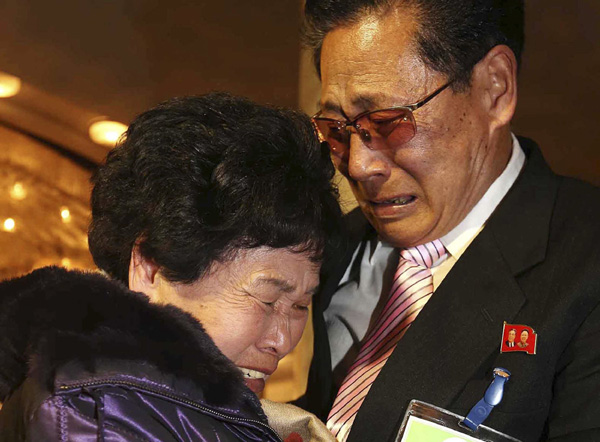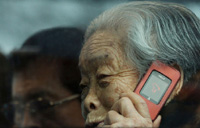 |
|
Lee Yun-geun (R), 72, from DPRK, hugs his South Korean sister Lee Sun-hyang, 88, during their family reunion at the Mount Kumgang resort in North Korea February 20, 2014. [Photo/Agencies] |
The next day, three meetings will be staged, including private meeting, group lunch and mass gathering for two hours each.
|
 |
On the third and final day of the brief reunion, the divided families will reunite for just one hour to bid farewell to their relatives, an expected tearful scene, before South Koreans return to the Sokcho resort at about 4 pm.
Under the same schedule, the second three-day reunion will be held from Sunday when 88 DPRK applicants will reunite with 372 family members from the South.
The 19th round of reunion, the first such humanitarian event since November 2010, came after top DPRK leader Kim Jong Un voiced his willingness to improve relations with South Korea in his New Year's speech.
In response to Seoul's call for sincerity with action, Pyongyang agreed to hold the family reunion as scheduled as the first step toward mending ties, though the annual South Korea-US joint military exercises is scheduled to begin on February 24, which the DPRK had urged Seoul to cancel or delay what it denounced as the rehearsal for a northward invasion.
Despite the humanitarian event launched as scheduled, urgency for frequent reunion is growing given the fast aging of members of the divided families.
Almost half of 129,264 South Koreans, who had applied for reunion since 1988, died without chance of meeting their long-lost relatives, according to the government data.
The applicants were aging rapidly, with 80 percent of the survivors older than 70. The applicants aged 80 and above account for 52.8 percent of the total at the end of 2013, up from 20.3 percent 10 years earlier.
The private Hyundai Research Institute forecast that all the separated families will pass away within 20 years given their average life expectancy, saying that the two Koreas should stage a large-scale extra reunion for those older than 80.
Family reunion center in Mount Kumgang should be constantly opened for active meetings, and at the same time, exchange of letters, video reunion and confirmation of life and death for divided families should be allowed, the think tank said.
|
|
|
|
|
|
|
|
